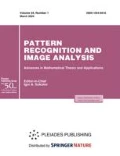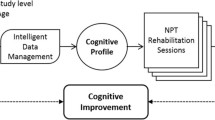Abstract
This article is devoted the foundations for designing a complex of applied intelligent systems for the diagnostics of the psychological safety and cognitive sphere of patients with a neurological pathology (IS DIPSYS-COS). Creation of a complex of applied IS DIPSYS-COS based on intelligent instrumental software IMSLOG will allow revealing various kinds of regularities of the psychological safety and cognitive sphere of patients on the base of the parameters (features) that determine the hardness, psychological well-being, world assumptions, and peculiarities of the cognitive sphere and that are required for decision-making using the graphic tools (including the cognitive graphic tools).


Similar content being viewed by others
REFERENCES
Yu. I. Zhuravlev, V. V. Ryazanov, and O. V. Senko, Recognition. Mathematical Methods. Software System. Practical Applications (Fazis, Moscow, 2005) [in Russian].
A. E. Yankovskaya, Logic Tests and Cognitive Graphics Means (LAP LAMBERT Acad. Publ., 2011) [in Russian].
A. E. Yankovskaya, “Test recognizing medical expert systems with elements of cognitive graphics,” Komp’yut. Khron., Nos. 8–9, 61–83 (1994) [in Russian].
A. E. Yankovskaya and N. N. Il’inskikh, “On the question of the development and application of intelligent biomedical systems,” Pattern Recognit. Image Anal. 8 (3), 470–472 (1998).
B. A. Kobrinskii, “Approaches to the construction of cognitive linguistic–image models of knowledge representation for medical intelligent systems,” Sci. Tech. Inf. Process. 43, 289–295 (2016) [in Russian].
B. A. Kobrinskii, “Retrospective analysis of medical expert systems,” Nov. Iskusstv. Intell., No. 2, 6–17 (2005) [in Russian].
W. A. Sands and M. F. Wiskoff, Expert System Planning: German Federal Armed Forces Psychological Service (1996). http://www.ijoa.org/imta96/paper36.html.
A. M. Blonk, J. H. L. van den Bercken, and E.E. J. De Bruyn, “Evaluation of DYSLEXPERT: A comparison of a knowledge-based system with experienced clinicians in the diagnosis of dyslexia,” Comput. Hum. Behav. 12 (4), 567–586 (1996).
E. A. Vaschenko, M. A. Vitushko, V. S. Pereverzev-Orlov, and I. I. Stepina, “Doctor’s advisor: Technologies and opportunities,” Inf. Protsessy 9 (1), 18–24 (2009) [in Russian].
L. V. Kan, Yu. M. Kuznetsova, and N. V. Chudova, “On the methodological foundations for the creation of expert systems for practical psychology,” Sci. Tech. Inf. Process. 38, 420–427 (2011) [in Russian].
Artificial Intelligence, Vol. 2: Models and Methods: Handbook, Ed. by D. A. Pospelov (Radio i Svyaz, Moscow, 1990) [in Russian].
A. E. Yankovskaya, S. V. Kitler, and R. V. Ametov, “Development and investigation of the intelligent system for diagnostics and intervention of organization stress,” Pattern Recognit. Image Anal. 23 (4), 459–467 (2013).
A. E. Yankovskaya and S. V. Kitler, “Fuzzy intelligent system for rapid diagnosis and prevention of depression: Development and testing,” in Fuzzy Systems and Soft Computing (NSMV-2014): Proceedings of the Sixth All-Russian Scientific-Practical Conf. (St. Petersburg, 2014), Vol. 2, pp. 188–197 [in Russian].
A. E. Yankovskaya, S. V. Kitler, and R. V. Ametov, “Fundamentals of creating an intelligent system for express diagnostics and prevention of depression,” in Proceedings of the Congress on Intelligent Systems and Information Technologies (Moscow, 2012), Vol. 2, pp. 265–272 [in Russian].
A. E. Yankovskaya, A. N. Kornetov, N. N. Ilinskikh, A. V. Silaeva, and V. B. Obukhovskaya, “Expansion of the complex of intelligent systems for rapid diagnosis and prevention of mental health,” in Sixth Intern. Conf. “System Analysis and Information Technology” SAIT-2015 (June 15–20, 2015, Svetlogorsk), Proceedings (Moscow, 2015), Vol. 2, pp. 170–180 [in Russian].
A. E. Yankovskaya, A. N. Kornetov, N. N. Il’inskikh, and V. B. Obukhovskaya, “An expansion of intelligent systems complex for express-diagnostics and prevention of organizational stress, depression, and deviant behavior on the basis of the biopsychosocial approach,” Pattern Recognit. Image Anal. 27 (4), 783–788 (2017).
J. M. Amosig, E. J. Escara, R. Martinez, and E. Paculanang, Feardex: Fear Diagnostic Expert System (2008). http://www.shvoong.com.
Y. Bouaiachi, M. Khaldi, and A. Azmani, “Neural network-based decision support system for pre-diagnosis of psychiatric disorders,” in Proc. of Information Science and Technology (CIST). Third IEEE Intern. Colloquium (2014), pp. 102–106.
V. E. Ekong, U. G. Inyang, and E. A. Onibere, “Intelligent decision support system for depression diagnosis based on neuro-fuzzy-CBR hybrid,” Mod. Appl. Sci. 6 (7), 79–88 (2012).
R. D. Ariyanti, S. Kusumadewi, and I. V. Paputungan, “Beck depression inventory test assessment using fuzzy inference system,” in Proc. of Int. Conf. on Intelligent Systems Modeling and Simulation (ISMS), IEEE Computer Society (2010), pp. 6–9.
M. E. Pollack, “Intelligent technology for an aging population: The use of AI to assist elders with cognitive impairment,” Al Mag. 26 (2), 9–24 (2005).
M. E. Pollack, L. Brown, D. Colbry, C. E. McCarthy, C. Orosz, B. Peintner, S. Ramakrishnan, and I. Tsamardinos, “Autominder: An intelligent cognitive orthotic system for people with memory impairment,” Rob. Auton. Syst. 44 (3–4), 273–282 (2003).
A. Morris, R. Donamukkala, A. Kapuria, A. Steinfeld, J. Matthews, J. Dunbar-Jacobs, and S. Thrun, “A robotic walker that provides guidance,” in Proceedings of the IEEE International Conference on Robotics and Automation (Piscataway, NJ, 2003), pp. 25–30.
P. Morris, N. Muscettola, and T. Vidal, “Dynamic control of plans with temporal uncertainty,” in Proceedings of the Seventeenth International Joint Conference on Artificial Intelligence (San Francisco, 2001), pp. 494–499.
R. Levinson, “PEAT – The Planning and Execution Assistant and Trainer,” J. Head Trauma Rehab. 12 (2), 85–91 (1997).
E. F. LoPresti, A. Mihailidis, and N. Kirsch, “Assistive technology for cognitive rehabilitation: State of the art,” Neuropsychol. Rehab. 14 (1–2), 5–39 (2004).
Neurological Disorders Affect Millions Globally: WHO Report (2007). https://www.who.int/mediacentre/news/releases/2007/pr04/en/.
GBD 2016 DALYs and HALE Collab., “Global, regional, and national disability-adjusted life-years (DALYs) for 333 diseases and injuries and healthy life expectancy (HALE) for 195 countries and territories, 1990–2016: A systematic analysis for the Global Burden of Disease Study 2016,” Lancet, 2017.
Neurological Disorders: Public Health Challenges (WHO, 2006).
A. E. Yankovskaya, A.I. Gedike, R. V. Ametov, and A. M. Bleikher, “IMSLOG-2002 software tool for supporting information technologies of test pattern recognition,” Pattern Recognit. Image Anal. 13 (2), 243–246 (2003).
Yu. I. Zhuravlev and I. B. Gurevich, “Pattern recognition and image analysis,” in Artificial Intelligence, Vol. 2: Models and Methods: Handbook, Ed. by D. A. Pospelov (Radio i Svyaz, Moscow, 1990) pp. 149–190 [in Russian].
ICD-10 (International Statistical Classification of Diseases) (Meditsina, Moscow, 2003) [in Russian].
A. E. Yankovskaya and V. B. Obukhovskaya, “Basics of creating an applied intelligent system for diagnosing the psychological safety of patients with neurological pathology,” in Materials of the International Conference “Scientific Research of the SCO Countries: Synergy and Integration” (2019), Part 2, pp. 184–190.
A. E. Yankovskaya and V. B. Obukhovskaya, “Basics of creating an intelligent system for diagnosing the cognitive sphere of patients with neurological pathology,” in Eighth International Conference “System Analysis and Information Technology” SAIT-2019 (July 8–14, 2019, Irkutsk–Listvyanka, Russia): Proceedings (Moscow, 2019), pp. 250–258 [in Russian] .
Funding
This study was supported by the Russian Foundation for Basic Research (project no. 18-013-00937).
Author information
Authors and Affiliations
Corresponding authors
Ethics declarations
CONFLICT OF INTEREST
The authors declare that they have no conflict of interest.
COMPLIANCE WITH ETHICAL STANDARDS
Statement of compliance with the standards of research involving humans as subjects. All procedures performed in the studies involving human participants were carried out in accordance with the ethical standards of the institutional and/or national research committee and with the 1964 Helsinki Declaration and its later amendments or comparable ethical standards.
Additional information

Anna Efimovna Yankovskaya. Born 1939. Graduated from Tomsk State University in 1961. She defended her candidate’s dissertation in 1969 and doctoral dissertation in 2001. Awarded the rank of full professor in 2003.She is Professor of the Department of Program Engineering at the Institute of Applied Mathematics and Computer Science of National Research Tomsk State University. Scientific interests: mathematical foundations of pattern recognition and theory of discrete control devices; logical tests focused on various problematic and cross-disciplinary domains; logical-combinatorial, logical-combinatorial-probabilistic and genetic algorithms; intelligent systems based on test methods of pattern recognition, cognitive tools. Author of more than 750 papers, including 7 monographs and 571 articles. Chair of the Tomsk Regional Branch of the RAS National committee of the Pattern Recognition and Image Analysis, Chair of the Tomsk Regional Branch of the Russian Association for Artificial Intelligence and the Russian Association of Pattern Recognition and Image Analysis. Member of European Academy of Natural Sciences and International Association for Pattern Recognition. Twice (in 1999 and 2002) was awarded the title of “Tomsk Oblast Laureate in the Sphere of Education and Science.” In 1994, was awarded the diploma of CAI-94 exhibition “Software and AI systems,” and in 2003 was awarded the Intel Corporation diploma of a research projects competition in the field of Computer Aided Design of Integrated Circuits. She is included in the book Great Minds of 21st Century, 4th ed. (American Biographical Institute, Raleigh, North Carolina, 2010).

Viktoriya Borisovna Obukhovskaya. Born 1991. Graduated from Siberian State Medical University in 2013. She defended her candidate’s dissertation in 2018. Expert at the Center of quality management and lean technologies, senior lecturer at the Department of fundamental psychology and behavioral medicine at the Siberian State Medical University, assistant professor at the Department of genetic and clinical psychology at Tomsk State University. Scientific interests: psychological safety, internal state of disease, relation to a disease, neurological pathology, quality of life, depression, anxiety. Author of 35 papers. Winner of the regional competition of social projects promoting a healthy lifestyle “It’s great to be healthy.” Won competition on “Best research” in the section “Psychological science” in 2017. Awarded first degree diploma in the competition at the V International Conference “Science of XXI century” in 2019.
Rights and permissions
About this article
Cite this article
Yankovskaya, A.E., Obukhovskaya, V.B. Foundations of Creation of a Complex of Applied Intelligent Systems for Diagnostics of Psychological Safety and Cognitive Sphere of Patients with a Neurological Pathology. Pattern Recognit. Image Anal. 30, 741–747 (2020). https://doi.org/10.1134/S1054661820040252
Received:
Revised:
Accepted:
Published:
Issue Date:
DOI: https://doi.org/10.1134/S1054661820040252




